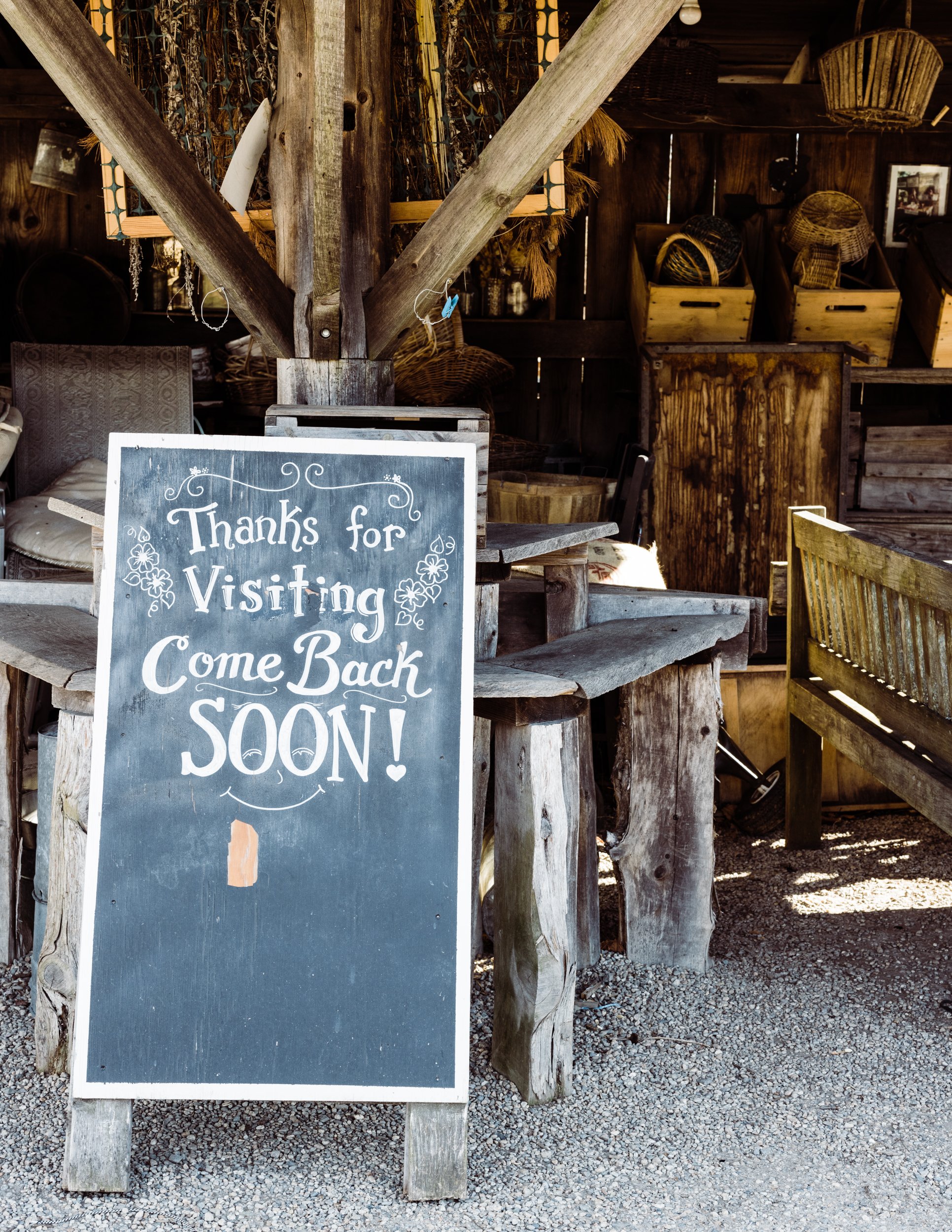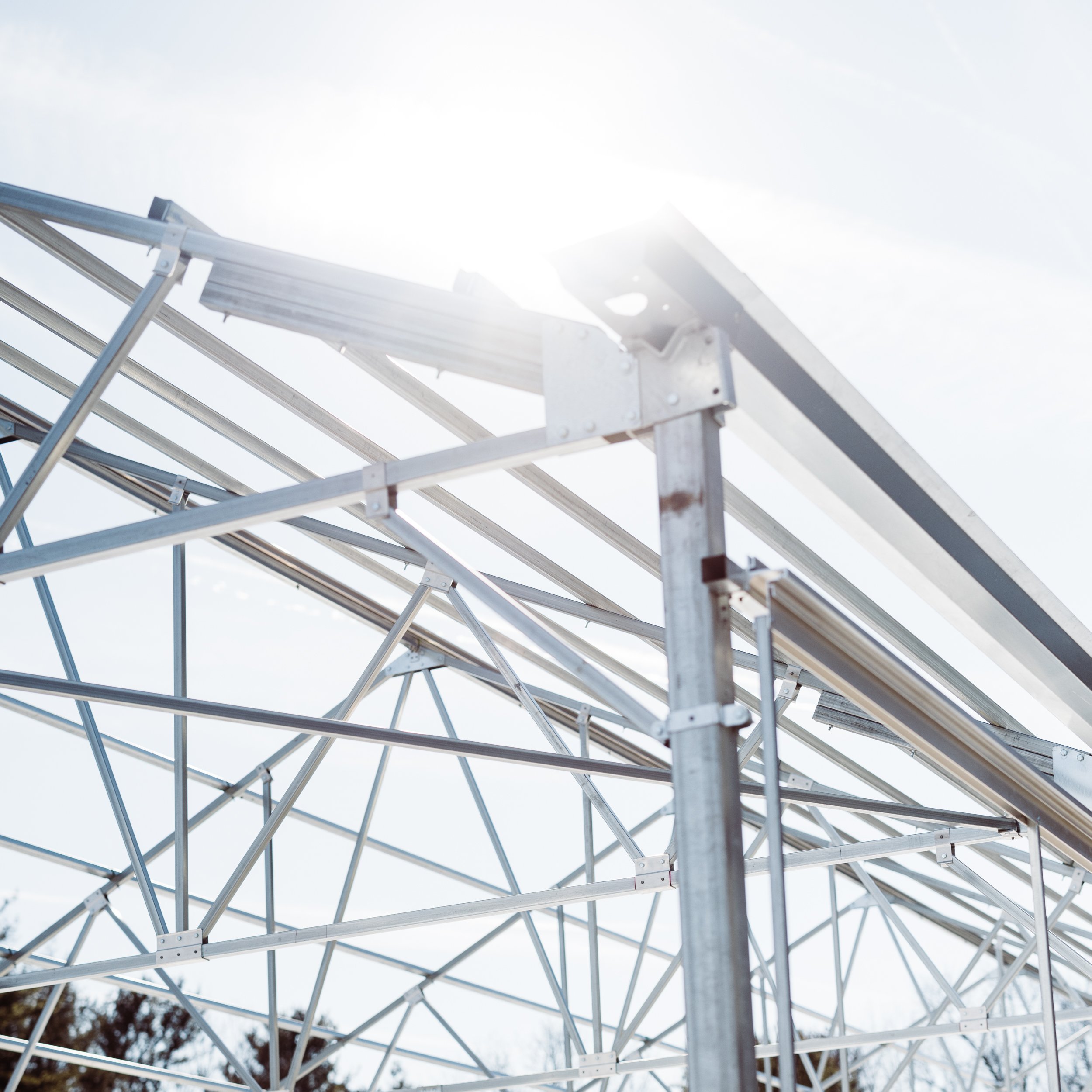Land’s Sake Farm, In Transition: A New Barn Rises in Weston
Photos by Michael Piazza
Land’s Sake Farm in Weston is currently under snow, mud and construction, a place lying in wait for warmer weather and an exciting future. Building plans developed by Boston architecture firm Payette have started to take shape. The first phase includes a new animal barn, greenhouse and hoop houses, along with the installation of much-needed utilities. These additions are expected to be finished by late May as the planting season is underway. Phase Two features a new, modern-rustic, energyefficient farmstand, complete with a demonstration kitchen, abundant retail space, storage coolers and more. Needless to say, the farm’s staff and much of the community eagerly await the improved Land’s Sake Farm.
Founded in 1980, Land’s Sake is a beloved rural refuge in the center of Weston, a well-to-do suburb less than 20 miles from Boston. Open to all, the farm is a place where children can run around, help grow food and care for animals, and families gather. Educating both school-age children and adults about the land, conservation and agriculture is an integral part of its mission. The farm, organically and sustainably managed, grows over 110,000 pounds of food each year and has over 300 subscribers to its community supported agriculture (CSA) program. Hundreds more stop in regularly to purchase fresh vegetables, herbs and flowers.
Land’s Sake donates about 30% of its annual harvest through partnerships with Boston-area hunger relief organizations as well as Weston’s Council on Aging; the latter distributes fresh vegetables to seniors on limited incomes. And about one-third of the children who participate in farm programs receive scholarships.
This is the little farm that could. How many customers purchasing just-picked vegetables know the farm has no electricity? Or running water? Or that most of the animals were borrowed? How many know that at the end of every day produce and other merchandise in the open farmstand has to be moved to a neighbor’s barn for safekeeping and returned and re-shelved the next morning? To operate year after year handicapped by these and other structural limitations, yet still achieve so much for so many, is truly a wonder. And a testament to the dedicated staff, volunteers, members and educators.
Then add to that all the new COVID safety protocols to contend with. Still, the farm keeps chugging along. Happily, within the next two years, Land’s Sake is planning to emerge bigger, more efficient and even more hospitable than it is today.
After securing a 30-year (land) lease from the Town of Weston in 2018, it was already clear that the farm’s constraints would continue to hinder its work. “We wanted to have a more sustainable model going forward,” says Land’s Sake Board President Beth Marshdoyle. She explains that the farm’s mission— connecting people to the land to build community and inspire lifelong stewardship—was increasingly precarious without necessary improvements in infrastructure. The $5 million building project, says Marshdoyle, “will allow the farm to operate and offer food year round, increase efficiency, reduce the farm’s reliance on neighbors and be more sustainable environmentally.”
On-site utilities are the most immediate need. For electricity, staff members have had to run long extension cords from a nearby barn. Above-ground water hoses distribute water, an impossible setup in cold weather. In addition to utilities, Phase One includes building a new animal barn and grazing area to accommodate animals year-round and provide space for education programs. The building will serve as the temporary farmstand until the new one is built. Also in the first phase is a new greenhouse and two hoop houses for full-year vegetable and herb production.
The existing farmstand, a rugged, shed-like structure long on country charm but short on practicality, was built as a temporary stand decades ago. There are no utilities or indoor space for shelter or storage. The architectural drawings for the new farmstand reveal a handsome 3,800-square-foot, net-zero energyefficient building. The roof will be covered with solar panels to provide 100% of the building’s electricity and energy conservation measures include natural ventilation, insulated walls and exterior shading. This new farmstand, expected to be finished by fall 2023, will feature an open kitchen for community cooking and dining, workshops and education programs. There will also be a small caf , coolers, root cellar, on-site wash station for all farm goods, staff office and restrooms. And plenty of space for displaying and selling farm produce and other products.
“We could never have done this without Payette,” says Land’s Sake Executive Director Pam Hess. (The architecture firm’s president, Kevin Sullivan, lives in Weston.) “The work was all pro bono and some vendors also provided free help,” she says.
This image courtesy of Land’s Sake Farm
To pay for the project, Land’s Sake, a nonprofit organization, embarked on a $5 million capital campaign called “Grow With Us.” Managed by Weston residents Brynja and Hannes Smarason, the initiative, entirely community funded, had already raised $3.5 million at the time of this writing. “We launched the campaign in late 2019, then COVID intervened and we paused for a while,” says Brynja Smarason. Because the pandemic exacerbated food insecurity as well as people’s fears of shopping in supermarkets, she says, “it ended up galvanizing our campaign. It’s all outdoors here so the farm was a safe haven.” The campaign recently received a generous commitment from a local donor who will match all donations, dollar-for-dollar, up to $500,000 through early June when the farmstand opens for the season.
Although Land’s Sake is in Weston, a predominantly wealthy town, Hess says, “We struggle like any other farm. We want to pay our farmers a living wage. And we can only charge so much for vegetables.” Approximately 70% of its budget is staff expenses. Operating funds come primarily from members, the CSA, farmstand sales, education program fees and September’s Harvest Dinner fundraiser.
The growing season typically starts in early March with plantings in the greenhouse. By mid-April, the seedlings and seeds for other crops will go in the ground providing it’s thawed enough and not too wet and muddy, says Farm Manager Brendan Murtha. The farm grows over 45 different vegetables and greens; some of the most popular include arugula, lettuces, tomatoes, cucumbers, summer and winter squash, sweet onions and garlic.
With the new infrastructure, “The quality of the produce will improve, which is huge,” says Murtha. “The new greenhouse will be much bigger and more energy efficient. And it will be a tighter structure, harder for rodents to get in.” With new coolers, crops can be chilled at the proper temperature and humidity, keeping them in a “perfect just-picked state” for a longer time.
Murtha adds that the improvements will increase efficiency farm-wide. “There’s a lot of inefficiencies in the way sites are located now,” he says. For example, the washing station for rinsing produce is over 100 yards from the cooler, where most of the produce is stored. “We do a lot of driving back and forth,” he says. The new farmstand will house the washing station, coolers and sales area.
Of the existing farmstand, Business Manager Heather Hilton says, “It’s an old structure, but so much more. It’s a magical place in season.” She acknowledges that, “The new stand will make our jobs and what we’re doing so much more enjoyable for our customers and staff. We’ll be able to set up the produce and other merchandise and not have to move it every night.”
Because of Land’s Sake’s proximity to Weston’s three elementary schools across the street, Hess says the farm has always been an education organization teaching about food, farming and conservation. Education Manager Katrina Goldowsky-Dill explains that, “Trips to the farm line up with the elementary school curriculum. After-school classes are independent, but we work with the schools to develop useful programming.” Children participate in ageappropriate chores, spend time with the animals, pick vegetables and more. Middle-schoolers can attend the after-school maple program where they help tap trees, collect sap, stack firewood and boil sap to make syrup. Maple trees are scattered around Weston and the sugar house is located near the middle school.
Summer activities for children include tending the garden, feeding and taking care of the animals and participating in outdoor food preparation and cooking, says Goldowsky-Dill. “We have cooking competitions every week, making pickles, using garden produce in pasta salads and making and cooking pizzas, tomato sauce and omelets with our chicken eggs.”
The educator adds, “The new buildings will allow us to run more regularly in the winter and not be so weather dependent. It will mean we can do more cooking and hands-on preparation. And we can keep animals year round.” (The farm’s chickens are currently housed in the farm office a few miles away and rabbits are fostered by families through the winter.) “We borrow goats in the summer but having our own small herd will allow us to care for them all year.”
Land’s Sake Farm has always been a special gathering and learning place for the community in addition to its everyday function as a working farm growing healthful foods. Once the new infrastructure is in place, it just won’t have to try so hard.
To support Land’s Sake Farm (and/or other community farms): become a member (which supports food growing, hunger relief, educational programs and community events); volunteer; join its CSA; buy food from the farm and/or Pick Your Own (PYO); make a donation. Learn more about the Capital Campaign at landssake.org/capital-campaign
This story appeared in the Spring 2022 issue.



